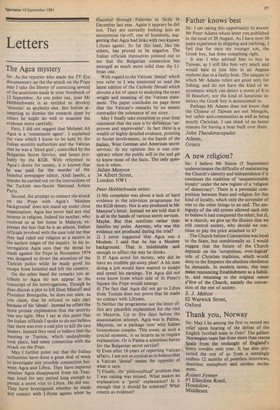The Agca mystery
Sir: As the reporter who made the TV Eye documentary on the the attack on the Pope may I take the liberty of correcting several of the assertions made in your Notebook of 12 September. As you point out, your Mr Hebblethwaite is as entitled to develop 'theories' as anybody else. But before attempting to dismiss the research done by others he might do well to examine the evidence more carefully.
First, I did not suggest that Mehmet Ali Agca is a 'communist agent'. I explained the view which I know to be held by the Italian security authorities and the Vatican that he was a 'hired gun', controlled by the Bulgarian Secret Service, and hence probably by the KGB. With reference to Agca's desire for money, it is known that he was paid for the murder of the Istanbul newspaper editor, Abdi Ipecki, a murder he carried out on the instructions of the Turkish neo-fascist National Action Party.
Second, the attempt to connect the attack on the Pope with Agca's 'Moslem background' does not stand up under close examination. Agca has never had any real interest in religion. Indeed his mother, who received us at her home in Malatya, expresses the fear that he is an atheist. Italian officials involved with the case told me that they had ruled out religion as a motive in the earliest stages of the inquiry. In his interrogation Agca says that the threat he made against the Pope in November 1979 was designed to divert the attention of the Turkish police while he made good his escape from Istanbul and left the country.
On the other hand the remarks you attribute to Agca do not appear in the transcript of his interrogations. Though he does discuss a plot to kill Dom Mintoff and President Bourguiba, he does not state, as You claim, that he refused to take part because of his 'ideals'. Instead he offers the more prosaic explanation that the security was too tight. May I say at this point that the Italian officials I spoke to do not believe that there was ever a real plot to kill the two leaders. Instead they tend to believe that the Meeting in Tunisia, which undoubtedly took place, had some connection with the attack on the Pope.
May I further point out that the Italian authorities have done a great deal of work to investigate any possible connection between Agca and Libya. They have inquired Whether Agca disappeared from his Tunisian hotel for any period long enough to Permit a secret visit to Libya. He did not. They have investigated whether he made any contact with Libyan agents when he tfansited through Palermo in Sicily in December last year. Again it appears he did not. They are currently looking into an anonymous tip-off, one of hundreds, suggesting that Agca had links with two known Libyan agents. So far this lead, like the others, has proved to be negative. The Italian officials themselves pointed out to me that the Bulgarian connection has emerged as much more solid than the Libyan one.
With regard to the Vatican 'denial' which you refer to I was interested to read the latest edition of the Catholic Herald which devotes a lot of space to analysing the exact weight and meaning of the Vatican statement. The paper concludes on page three that the Vatican's remarks by no means contradict the substance of my story.
May I finally take exception to your limp statement that the case is by definition 'unproven and unprovable'. In fact there is a wealth of highly detailed evidence, pointing to Soviet involvement, in the hands of the Italian, West German and American secret services. In my opinion this is one conspiracy where the public will in the end get to know most of the facts. The only question is when.
Julian Manyon 34 Albert Street, London NW1


































 Previous page
Previous page